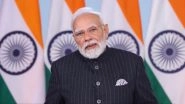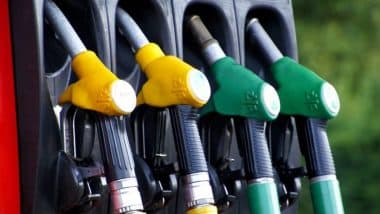Islamabad, September 16: The petrol and diesel prices in Pakistan have reached a record high after Pakistan’s interim government increased the prices by PKR 26.02 and PKR 17.34 per litre, respectively, Dawn News reported on Saturday. Previously, the hike in gas prices was noticed in August month with PKR 32.41 and PKR 38.49 per litre respectively. Now, the combined increase now works out at PKR 58.43 and PKR 55.83 per litre within one month.
The Pakistani news daily reported that the increase in petroleum prices occurred owing to the 27.4 per cent increase in the rate of inflation in August month. The rise in the rate brings the price of petrol to PKR 333.38 per litre and the rate of high-speed diesel is PKR 329.18 per litre. Pakistan's Ministry of Finance announced the increase in the price of petrol and high-speed diesel, the report said. Fuel Price Rise in Pakistan: Caretaker Government Hikes Petrol Price by Nearly Rs 15, High-Speed Diesel by Rs 18.
The cash-strapped government of Pakistan is now drilling a massive hole in the pockets of its citizens by increasing prices of petrol and diesel. Pakistan's Ministry of Finance said that the decision was taken due to the increasing trend of petrol prices in the international market. No revision of price was mentioned regarding the price of kerosene or light diesel oil, according to Dawn's report.
Petrol is mostly used in private transport, small vehicles, rickshaws and two-wheelers and has a direct impact on the budget of the middle and lower-middle class. The majority of the transport sector operates on high-speed diesel. Its price is considered highly inflationary as it is mostly used in heavy transport vehicles, trains and agricultural engines like trucks, buses, tractors, tube wells and threshers, Dawn reported. Pakistan: Alcohol and Cocaine Detected in Imran Khan’s Urine Samples, Claims Health Minister Abdul Qadir Patel.
Meanwhile, Pakistan's inflation rate remained over the target in August at 27.4 per cent as reforms outlined as requirements for an IMF loan make it more difficult to control price pressures, ARY News reported citing the official data released on September 1. After the avoidance of a sovereign debt default in July due to a USD 3 billion loan programme of the International Monetary Fund (IMF), Pakistan is on a difficult road to economic recovery under a caretaker administration.
Reforms related to the bailout, such as loosening import limits and demanding the removal of subsidies, have already fuelled annual inflation, which increased to a record 38.0 per cent in May. In addition, interest rates were increased, and the rupee dropped to record lows. The currency dropped 6.2 per cent last month, according to ARY News. The inflation rate for food remained high at 38.5 per cent in August, according to figures from Pakistan's statistics department, despite a minor decline from July's 28.3 per cent rate.
(The above story is verified and authored by ANI staff, ANI is South Asia's leading multimedia news agency with over 100 bureaus in India, South Asia and across the globe. ANI brings the latest news on Politics and Current Affairs in India & around the World, Sports, Health, Fitness, Entertainment, & News. The views appearing in the above post do not reflect the opinions of LatestLY)













 Quickly
Quickly


